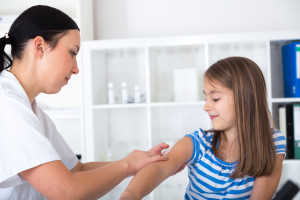Is the HPV vaccine safe for my teen?
 As a parent, HPV can be a scary concept. No one wants to discuss cancer with their pre-teens, but research shows that children should receive the HPV vaccination as early as 11 years old. HPV refers to the sexually transmitted infection (STI) called human papillomavirus (HPV). As the most common STI, more than 100 variations of HPV exist. Some people with HPV never experience symptoms and the virus may go away on its own within a couple years. However, HPV can also lead to genital warts and cancer, with the Center for Disease Control and Prevention (CDC) reporting more than 32,000 cases of HPV-related cancers each year.
As a parent, HPV can be a scary concept. No one wants to discuss cancer with their pre-teens, but research shows that children should receive the HPV vaccination as early as 11 years old. HPV refers to the sexually transmitted infection (STI) called human papillomavirus (HPV). As the most common STI, more than 100 variations of HPV exist. Some people with HPV never experience symptoms and the virus may go away on its own within a couple years. However, HPV can also lead to genital warts and cancer, with the Center for Disease Control and Prevention (CDC) reporting more than 32,000 cases of HPV-related cancers each year.
So, you may be wondering, how is HPV contracted? As an STI, the HPV virus is contracted through skin-to-skin contact, even if intercourse does not take place. Genital contact to the mouth, anus, and vagina can result in contraction of HPV.
According to the CDC, “HPV is a very common virus; nearly 80 million people—about one in four—are currently infected in the United States.” Upward of 14 million people, including teens, will contract the virus each year. HPV affects both men and woman and can cause the following cancers: cervix, vagina, vulva, penis, anus and throat. In addition to the 32,000-plus cases of cervical cancer, the CDC reports, “Every year in the United States, nearly 500,000 women are diagnosed with low grade cervical pre-cancers, and more than 200,000 women are diagnosed with high grade cervical lesions.”
Thanks to advances in medicine, a vaccination can help stop HPV by protecting against cancers caused by the HPV infection. The CDC recommends that all children, male and female, be vaccinated at age 11 or 12. In adolescents, two doses are needed six months apart. Teens over 14 years will need three doses over six months. All woman under 26 and all men under 21 should receive updates to the vaccination as they grow older. Additionally, the LGBTQ community should also receive the vaccination.
In addition to the vaccination, what else can be done to protect children? Talk with your teens, even if you don’t suspect they are engaging in sexual relationships. While these conversations can be tough at the time, remember that your child’s long-term health is paramount. It’s better to have the conversation early, rather than waiting until they are sexually active. Additionally, speak to your teens about proper condom use and monogamous relationships. Lastly, encourage sexually active adults, aged 21 to 65, to receive regular cervical cancer screenings from their doctor.
Sources:
https://www.cdc.gov/hpv/parents/vaccine.html
https://www.plannedparenthood.org/learn/stds-hiv-safer-sex/hpv
